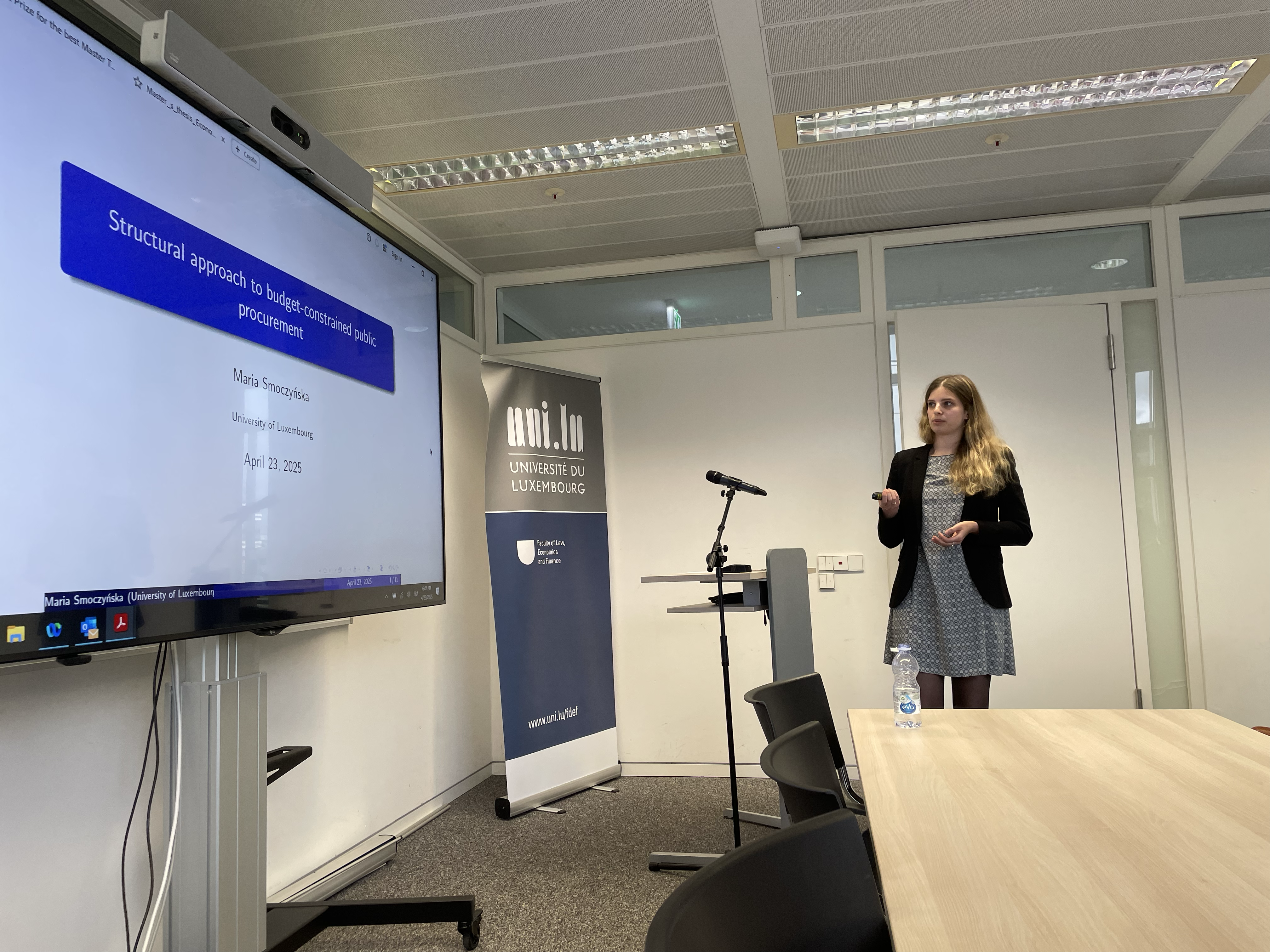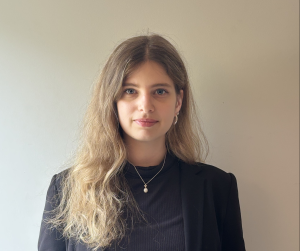Maria Smoczyńska, a graduate of the Master in Finance and Economics (MFE) and a recent graduate of the Master in Quantitative Economics and Finance (MQEF) at the University of Luxembourg, is preparing for her next academic adventure: a PhD in economics at Northwestern University in the United States. Regularly ranked among the top 10 economics PhD programmes in the country and particularly renowned for its strength in economic theory, Northwestern is a highly competitive and prestigious destination for aspiring researchers.
In this interview, Maria shares how her time at the University of Luxembourg helped shape her research interests, prepare her for doctoral studies, and ultimately led her to one of the world’s leading institutions for economic research.
Maria, how did you learn about the Master in Finance and Economics and Master in Quantitative Economics and Finance at the University of Luxembourg? What factors helped you decide it was the right fit for you?
I was looking at various Master’s programmes in Europe. I knew I wanted to study abroad, and the University of Luxembourg came up during my research. I found it appealing that it offers a wide range of programmes in English. So, I came to Luxembourg for M1 and I noticed the Quantitative Economics specialisation during my first year and became very interested.
What aspects of the Master in Finance and Economics (MFE) did you find most rewarding—academically, professionally, or personally?
One of the most rewarding aspects of the Master in Finance and Economics was the programme’s academic structure. Courses in econometrics, mathematics, and statistics were particularly interesting and provided me with a foundation for continuing my studies at MQEF. On a personal level, I greatly valued the international environment and the opportunity to collaborate with peers from diverse backgrounds.
Did you receive a scholarship when you joined the MFE?
Yes, when I joined the Master in Finance and Economics programme, securing financial support was one of my top priorities. I successfully received two scholarships available to students in the programme. The first was a merit-based scholarship from Advanzia Bank, which covered the entire duration of my studies. The second was a one-time payment from the ABBL Foundation.
How did the Master in Finance and Economics help you gain professional experience in Luxembourg or beyond?
The Master in Finance and Economics programme helped me gain professional experience primarily through a summer internship at Advanzia Bank—an opportunity I greatly appreciated. This experience allowed me to apply the analytical and financial skills I had developed during the programme in a real-world setting and learn more about the banking industry in Luxembourg. While the fourth semester of the MFE programme allows for an internship, I chose to focus on an academic Master’s thesis instead. As a result, apart from the summer internship, I did not take on additional professional roles during my studies.
What motivated you to choose Master in Quantitative Economics and Finance after that?
I was happy to discover that this programme offered a good balance for people interested in both academia and the private sector. We never know how our preferences might change. Initially, I was hesitating as I knew it would be quite an intense year, but I was convinced by Professor Holcblat, who encouraged me to apply. Additionally, there were courses in the second semester of the first year during M1 that were really inspiring for me: Asset Pricing and Econometrics with Professor Benjamin Holcblat, and Macroeconomics with Professor Julien Penasse. The quality of teaching and engaging discussions encouraged me to pursue the MQEF.
Can you describe your transition from Master 1 in Finance and Economics to the MQEF (M2)? Did anyone play a particular role in encouraging you to apply to MQEF?
Professor Holcblat believed in me and encouraged me to apply for the MQEF. We had many conversations about research and academia. In the summer, I emailed him to say I wanted to give this Master a try, and he was supportive. Since I was already studying at the University of Luxembourg and was one of the best students, I didn’t have to apply in the usual way – it was more of an internal continuation.
What was your thesis about, and how did you come up with the topic?
My thesis was inspired by a course in game theory with Professor Vincent Anesi. My thesis is about budget-constrained procurement and auctions. During my studies, I’ve become interested in microeconomics and game theory, and I wanted to explore mechanism design. This topic aligned well with my interests and helped me prepare for my PhD.

What kind of student is the MQEF best suited for?
It’s definitely for students who are interested in pursuing research and are not afraid of a challenge. It’s for people who are curious and want to understand the “why” behind economic phenomena – not just how to apply models, but how to build them.
Which courses were most useful for your PhD preparation?
It’s hard to pick, but I’d say microeconomics, econometrics, macroeconomics, and the math component- so basically, the first semester of MQEF is especially important. This semester gave me a solid foundation and changed the way I think about economics. I started to understand how to read academic papers and how to approach research.
What made you choose Northwestern University and what was your PhD application process like?
I applied to many programmes in the U.S. I had been thinking about a PhD for a long time, and I knew I wanted to go to the U.S. because of the research environment. The process is very competitive. You can’t predict outcomes based on your grades or CV alone – faculty fit, cohort balance, and many other factors play a role.
The research interests of the faculty of Northwestern University matched mine, especially in the areas I worked on during my thesis. I also liked the structure of their programme and the research opportunities. Northwestern University is regularly ranked among the top 10 economics PhD programmes in the USA, especially in economics theory.
How did our Faculty support you during the application process?
They were incredibly helpful. Especially, junior faculty members from the Department of Finance provided detailed feedback on my research ideas and helped me prepare for interviews. One of the most significant parts of the application to PhD programmes are recommendation letters and I was lucky to receive them from my professors from the MQEF. Without their academic support, my aspirations wouldn’t become a reality.
Professor Roberto Steri, my thesis supervisor, was very supportive as well. After I sent all of my applications, he reminded me that I did what I could best and the rejection part is not personal. He highlighted that the application process involves a lot of randomness. His encouragement helped me stay focused and optimistic.
Looking back, what are you most proud of in your journey so far?
I’m proud that I didn’t give up. It wasn’t always easy, but I kept working hard. This is a motto of one of my professors, Professor Christos Koulovatianos, who, during the admissions process, also reminded me and emphasised the importance of consistency. He repeatedly said that I need to remember that any success worth having comes from continuous, everyday effort. Additionally, I simply enjoy doing what I do, and I think that’s what helped me keep going. I hope I will continue to work with the same mindset in the U.S.
What advice would you give to students who are considering applying for a PhD?
Be brave and try. I know that many students hesitate to choose the MQEF because they think it’s too difficult. But I hope my story shows that it’s possible. The programme is excellent for people who are intellectually curious and are willing to put in the effort. MQEF not only provides rigorous academic training, but also opens many pathways—whether in academia, policy, or the private sector. I hope that by sharing my experience, I can encourage others to join this programme.
